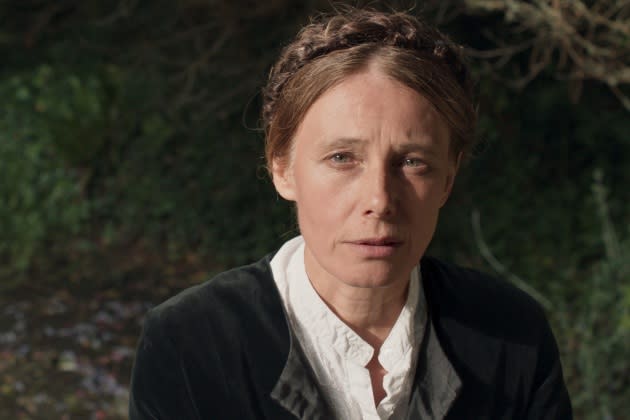‘A Couple’ Review: Frederick Wiseman Turns to Narrative Filmmaking — Kind of — in This Short, Literate Curio
- Oops!Something went wrong.Please try again later.
- Oops!Something went wrong.Please try again later.

Six decades into a career of over 40 films, the last thing you might request of a new feature from 92-year-old documentarian Frederick Wiseman is that it surprise us. Yet after a run of expansive, richly process-oriented observations of mostly American institutions and communities, his new film, “A Couple,” upends expectations of his work in what feels an almost mirthfully perverse number of ways. For starters, it’s laser-focused on just one person, not a heaving collective of human labor and activity. It’s short — very much so, in fact, barely stretching past an hour. Also, lest we be burying the lede, it’s not a documentary. Wiseman’s first narrative feature in 20 years sees him collaborating with French actor-writer Nathalie Boutefeu on a biopic of sorts: a portrait of Leo Tolstoy’s anguished wife Sophia, dramatizing her marital dissatisfaction and psychic pain with with a lyrical, literate ear.
For viewers going in with that knowledge, then, perhaps the most significant surprise of “A Couple” is the extent to which its still feels, in quiet, diligent spirit, like a Frederick Wiseman film. Working with his regular DP John Davey, Wiseman shoots Boutefeu in the same reserved, unintrusively watchful manner he does the human subjects of his non-fiction work: There’s a case to be made for “A Couple” preserving performance in a way akin to such performer-centered Wiseman works as “La Danse” and “Crazy Horse,” albeit at much closer, more whispery range. Perhaps Wiseman’s drama is its own form of documentary.
More from Variety
'Palimpsest' Helmer Hanna Västinsalo Readies 'Space Hobos,' New Series 'Heaven' (EXCLUSIVE)
Late Motherhood Gets the Spotlight in Rebecca Zlotowski's 'Other People's Children'
'Pearl' Review: In 'X' Prequel, Mia Goth Shows Where Her Repressed Antihero Went off the Rails
There are mixed rewards to this consistency of directorial perspective. “A Couple” benefits from the measured, deliberate care with which Wiseman tends to treat real-world bodies, and projects a palpable sense of obligation to historical record in essaying and enacting a real-life figure. Drawn directly from the diaries and journals of Sophia Tolstoy, and correspondence between her and her husband, Wiseman and Boutefeu’s script has the air of a deftly woven research project. The final film is elegant and empathetic, but never quite emotionally involving: For all its rich, heightened articulation of a woman’s distress and unrest, the sense of a life being academically magnified under glass never quite leaves the endeavor.
The title is a witty misdirection, as “A Couple” turns out to be a one-woman show. Leo Tolstoy is present only via his absence, a void that taunts Sophia into ever-hotter expressions of resentment and rage against him, as she paces the lushly landscaped oceanside grounds of the estate he no longer seems to occupy. The lavender box hedges are just one of many tells that this isn’t Russia but the Brittany island of Belle-Île; more notably, this Sophia voices all her thoughts in perfect French, a bit of dramatic license that further grants a universal span to these confessions of an ill-treated woman in a pre-feminist age.
Wiseman and Boutefeu offer no dates or specifics as to where we are in the Tolstoys’ troubled marriage, which yielded 13 children and a litany of personal wounds: Her face, haloed by a girlish crown braid, is weary enough to tell us her grievances are longstanding ones, yet not so lined as to suggest she’s near the end of her misery. (The marriage lasted until Leo Tolstoy’s death, aged 82.) Near the beginning of her film-long monologue, begun at a small writing desk by oil lamplight, she’s inclined toward self-blame: “I felt sorry for you for having married me,” she confesses, deeming herself unworthy of his genius, thanking him for what happiness they’ve shared and apologizing for not bringing him more.
Gradually, as she parades the gardens to a soundtrack of rolling waves and snarling seagulls, her internal fire rises. “ Your life is intense and rich, but so is mine,” she snipes to her invisible husband, as if anticipating his self-aggrandizing arguments: “With your family, you live a life more separate than our separation.” Occasionally, she slides into his abusive voice, volleying accusations at herself of illogical thinking and contaminating the air around him, before reverting to her own to defend herself — chiding him for his inattentiveness as a parent and spouse, and for his obliviousness or indifference to her now-unleashed disenchantment.
This slow uptick in assertiveness lends narrative shape and momentum to what is essentially — notwithstanding occasional shifts in windblown scenery — a filmed soliloquy, delivered with unabashed, tremulous theatricality by Boutefeu, usually with no set, props or scene partners to work with but tawny plants and a fraying floral shawl. Her speech is punctuated by cutaways to crisply framed images of nature in repose, not Wiseman’s usual field of interest, but here poignant in their humble resistance to her tumult: a flourish of gorse flowers, a half-bloomed rose, a scowling, food-spying gull.
Such stray details and contrasts grant an existentially-minded grace to this curious, neither-fish-nor-fowl mini-film — one that feels born of an entirely different form and sensibility from its bigger, brasher peers in Venice’s main competition, where “A Couple” has been rather oddly placed. It certainly feels a closer affinity to Leo Tolstoy’s thorny gravity and Sophia Tolstoy’s serene torment that 2009’s “The Last Station,” a windy, over-acted prestige drama about the Tolstoys’ marriage that earned Oscar nominations for its stars but no permanent place in the popular imagination. At the very least, Wiseman’s softly radical diversion points to a fresh path for the Great Figures of History genre.
Best of Variety
Sign up for Variety’s Newsletter. For the latest news, follow us on Facebook, Twitter, and Instagram.
